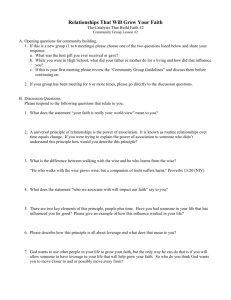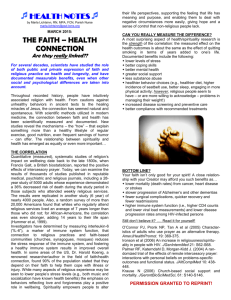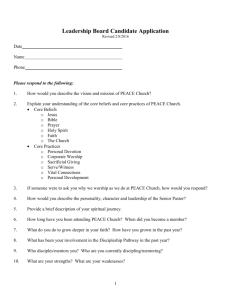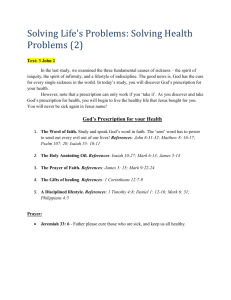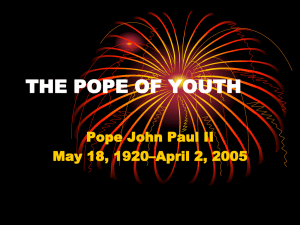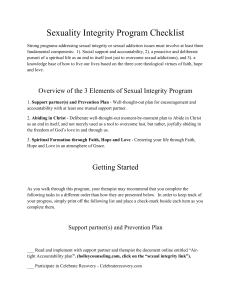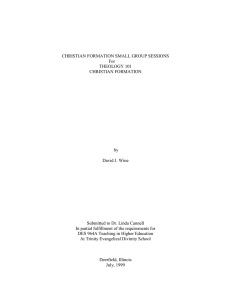“Going Public”
advertisement
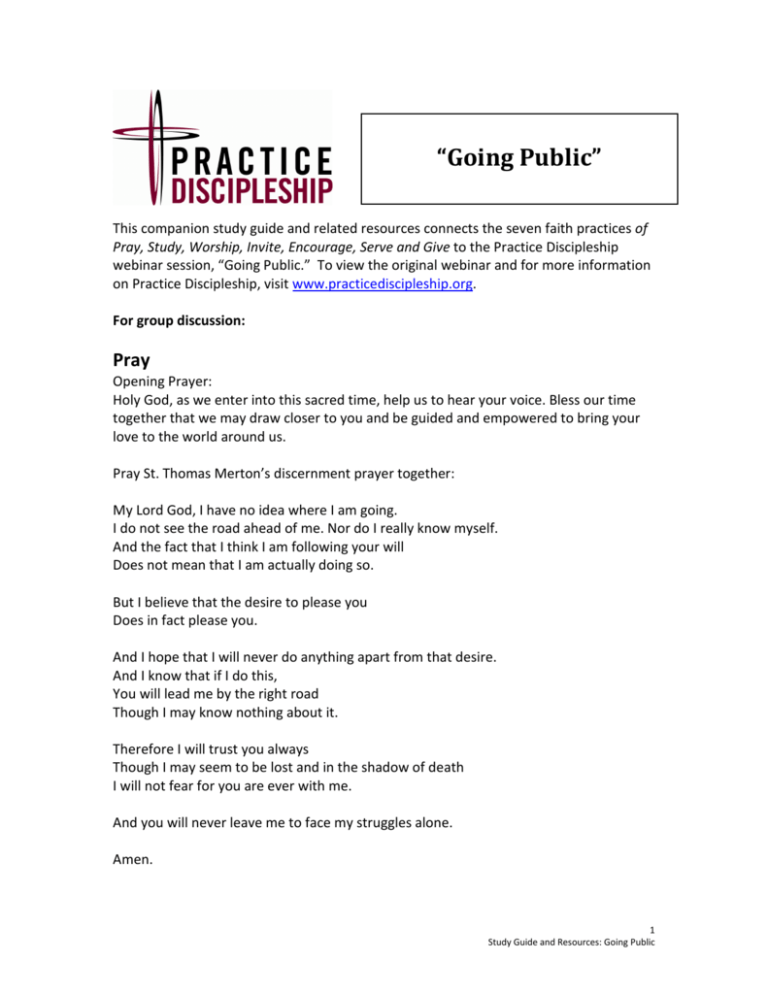
“Going Public” This companion study guide and related resources connects the seven faith practices of Pray, Study, Worship, Invite, Encourage, Serve and Give to the Practice Discipleship webinar session, “Going Public.” To view the original webinar and for more information on Practice Discipleship, visit www.practicediscipleship.org. For group discussion: Pray Opening Prayer: Holy God, as we enter into this sacred time, help us to hear your voice. Bless our time together that we may draw closer to you and be guided and empowered to bring your love to the world around us. Pray St. Thomas Merton’s discernment prayer together: My Lord God, I have no idea where I am going. I do not see the road ahead of me. Nor do I really know myself. And the fact that I think I am following your will Does not mean that I am actually doing so. But I believe that the desire to please you Does in fact please you. And I hope that I will never do anything apart from that desire. And I know that if I do this, You will lead me by the right road Though I may know nothing about it. Therefore I will trust you always Though I may seem to be lost and in the shadow of death I will not fear for you are ever with me. And you will never leave me to face my struggles alone. Amen. 1 Study Guide and Resources: Going Public Study According to Kinnamen (cited in the “Going Public” webinar by Jeremy Myers), one key area of weakness in the church’s approach to discipleship is an understanding of vocation. In other words, congregations need to understand that each member has a unique calling by God to serve the world. Have one person read Isaiah 43: 1-13 and encourage others to actively listen for what stands out to them. • What words, phrases, or images stood out to you? Why? Have everyone read the same passage silently and individually. • What was meaningful to you this time? • What does it mean to be created and redeemed by God? (vs 1)? • What does this passage say about vocation? • What does vocation look like in your life? • How do you practice discernment in your own life? • How do you explain discernment and vocation to the youth you work with? Worship Read through these ideas on how to worship while celebrating the theme of creation care—one of the ideas Jeremy Myers suggests as a response to “anti-science” church ideas. http://www.letallcreationpraise.org/ • What ideas from here, or others that you think of, could you include in your worship setting? Invite Part of the difficulty in inviting others may be not knowing what to say or not feeling comfortable with not knowing all the answers. Kinnamen posits six reasons why people leave the church: 1. The church is overprotective 2. The church is shallow 3. The church is anti-science 4. The church is repressive 5. The church is exclusive 6. The church is doubtless • Do you agree with any of these statements? Disagree? Role-play some scenarios based on these reasons. You invite someone to church; they respond with one of the six statements listed above. What would you say to respectfully continue the dialog? 2 Study Guide and Resources: Going Public Encourage Think back on your own faith life. • Who shaped your faith? Who was/is this person and his/her relationship to you? • What did this person specifically do that made a difference in your faith growth? • What are practices/specific things you hope to do with the youth you work with to encourage their faith? Jeremy Myers uses the term “apprenticeship” as a way of modeling faith. • What are apprentice experiences that you’ve had (faith or professional)? • What opportunities does your ministry setting offer to apprentice youth? • What apprentice models exist in your synod or community? • What are apprentice opportunities that God may be calling your community to try? Serve A focus of this lesson is the importance of intergenerational ministry, particularly as it relates to the common good. • What are ways that your ministry setting encourages intergenerational activity? How could one of these ministries extend into the local community or be more present? • What are ways that your local/regional community offers opportunities for generations to interact? How could your congregation participate in them? Give Giving reflects our understanding that we are stewards of God’s gifts to us and called to use financial and personal resources in service to the world. We are called to give not only of our money, but of our time and of ourselves. • Reflect on Kinnamen’s six reasons for leaving the church (printed above). • Which of those do you think resonates most strongly with your church community? With your local community? • Discern ways to give that respond to one or more of Kinnamen’s reasons. For example, if the idea of being “exclusive” resonates, give to a local organization that promotes equality; if “anti-science” resonates, give to an environmental organization, etc. Closing Prayer: God of generations, thank you for what we have learned in this community. We pray for the discipline to practice these art forms, the wisdom to see the unity between our faith and the world, and the courage to live as you call us to. Amen. 3 Study Guide and Resources: Going Public Related Resources for congregations Pray One art form that Jeremy Myers explains is lectio divina. This is one book on it that includes scripture sorted by topic that naturally lends itself to lectio divina: http://www.amazon.com/Too-Deep-Words-RediscoveringLectio/dp/0809129590/ref=sr_1_3?s=books&ie=UTF8&qid=1369957994&sr=13&keywords=lectio+divina A video that teaches the practice of lectio divina: http://www.youtube.com/watch?v=-jqqWZuo5cg This children’s book explains the Awareness Examen and describes ways to make it part of rituals for families and small groups. http://www.amazon.com/Sleeping-BreadHolding-What-Gives/dp/0809135795/ref=sr_1_1?ie=UTF8&qid=1369958626&sr=81&keywords=sleeping+with+bread Study Jeremy Myers mentions that the church is sometimes seen as anti-science and exclusive. The study Economy of Love asks hard questions about how we live and use resources in a way that reflects our faith: http://www.amazon.com/Economy-Love-Creating-CommunityEnough/dp/0834125447/ref=sr_1_1?ie=UTF8&qid=1369963789&sr=81&keywords=economy+of+love Unbinding Your Heart: 40 Days of Prayer and Faith Sharing is a study designed for small groups or an entire congregation. It focuses on how reading the Bible naturally leads to prayer and how prayer leads to evangelism. http://www.amazon.com/Unbinding-YourHeart-All-Churchpersonal/dp/0827238053/ref=sr_1_1?s=books&ie=UTF8&qid=1369945464&sr=11&keywords=unbinding+your+heart Whole Prayer connects Bible study to prayer, describing the cycle between reading, listening, and speaking as one that must involve all components. http://www.amazon.com/Whole-Prayer-Walter-WangerinJr/dp/0310242584/ref=tmm_pap_title_0 Worship Resources for worship related to discernment (hymns, prayers, etc.) http://www.practicingourfaith.org/discernment-ways-practice-worship 4 Study Guide and Resources: Going Public Invite Rev. Dr. David Lose, professor at Luther Seminary, speaks about the importance of evangelism within our Lutheran understanding and recommends resources. http://day1.org/4916-david_lose_if_this_is_your_picture_of_evangelism Encourage One aspect of encouraging is building relationships and connections within the church. What is This?: Faith Conversations for Mentors and Youth provides activities and conversation starters for intergenerational ministry. http://store.augsburgfortress.org/store/product/6462/What-is-This-FaithConversations-for-Mentors-and-Youth Serve After service trips or projects, some of the most critical work can happen in the processing, or the art form that Jeremy Myers calls “reflection.” This article discusses strategies to help youth reflect on their service experiences: https://youthministry360.com/blog/ym-essentials-helping-students-process-theirmission-trip The SALLT (Service and Learning Leadership Team) Project utilizes an intentional service learning process to make service experiences transformational. A free app for iPhone and Android includes photo sharing, a journal, Bible verses, reflection questions, a Leader Toolkit section, and more. http://www.sallt.org/ Give Kinnaman posits that the “anti-science” stances of the church may discourage people from attending; Myers suggests the response of steward creation. The ELCA has compiled resources and opportunities to give and serve in ways that care for creation. http://www.elca.org/Our-Faith-In-Action/Justice/Advocacy/CongregationalResources/Caring-For-Creation.aspx The Practice Discipleship Initiative is a ministry of the ELCA Youth Ministry Network (www.elcaymnet.org), in partnership with the ELCA, ELCA Seminaries and ELCA Colleges. The purpose of Practice Discipleship is to foster faithful, thoughtful and intentional leaders in congregations who follow Jesus in their daily lives. For more information, visit www.practicediscipleship.org. 5 Study Guide and Resources: Going Public
